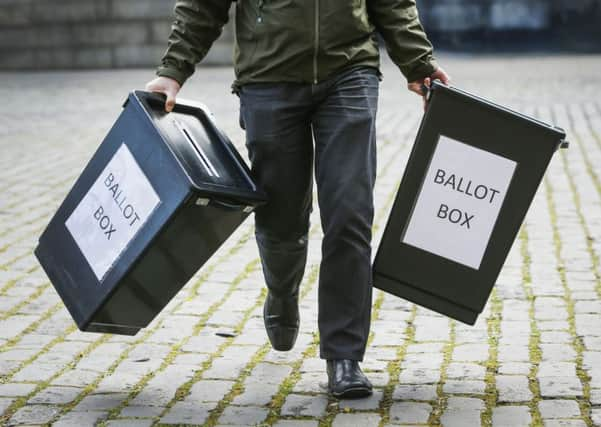Voters go to polls in Northern Ireland council elections


Voters will elect 462 councillors, choosing from 819 candidates.
Votes will be cast in 1,423 polling stations across 11 council areas. As usual, voters will use the single transferable vote, allowing them to rank candidates in order of their preference.
Advertisement
Hide AdAdvertisement
Hide AdBelfast is the largest council, electing 60 councillors, while every other council area has 40 or 41 councillors.
More than 1.3 million people are registered to vote in today’s election. In the last council elections almost half of those registered to vote did not bother to do so, with turnout at 51.3%.
However, that came in a period where there had been growing political apathy. In recent years, that pattern has reversed, with turnouts of around 65% in both the Assembly and then the Westminster elections of 2017.
The last Assembly elections also produced disappointing results for the DUP and Sinn Fein. The DUP, facing unionist unhappiness at Peter Robinson and a host of unionist alternatives on ballot papers, saw its vote slip by four percentage points to 23%.
Advertisement
Hide AdAdvertisement
Hide AdSinn Fein, facing frustration at its role in an unpopular Stormont system which was not seen to be delivering for nationalism, also saw its vote slip but by less, falling to 24.3%.
By contrast, those parties are now far stronger. As they confirmed their dominance over rivals and as politics tribalised further, Sinn Fein’s vote in the 2017 Westminster election rose to 29.4% while the DUP’s vote soared to 36%.
Although council and Westminster elections are not entirely analogous, the gap between those sets of results means that even if the DUP and Sinn Fein were to lose significant support since 2017, they could still make significant council gains across Northern Ireland.
The count could be protracted in some areas, especially if there is an increased turnout, meaning more votes to be counted.
Advertisement
Hide AdAdvertisement
Hide AdThe final result is unlikely to be known until later on Saturday with Belfast, as the largest council area, likely to be the last council to declare.
Although voters are electing councillors – whose responsibilities are centred on bin collections, leisure facilities, planning and building control – the results will be significant to the question of whether Stormont returns.
The election is also the first electoral test of two new nationalist offerings – Aontú, the pro-life republican party set up by former Sinn Fein TD Peadar Tóibín, and the new SDLP-Fianna Fail alliance.
The Ulster Unionist Party had a relatively good election in 2014 and will be attempting to hold on to those gains, despite having lost votes in other elections since that point. Alliance will be attempting to hold on to its 32 councillors but also expand its support base by standing in areas much further away from its eastern heartland.
Advertisement
Hide AdAdvertisement
Hide AdIt will also be significant for the smaller parties – the TUV, the Green Party, Ukip, the PUP and People Before Profit, attempting to retain their support in the face of the DUP-Sinn Fein juggernaut.
Ann Watt, head of the Electoral Commission in Northern Ireland said: “The 11 councils across Northern Ireland play an important role in the delivery of local services. The 462 councillors elected will make important decisions on issues that affect everyone in their local area – from leisure services to recycling to food safety.”
Polling stations will open at 7am and remain open until 10pm tonight.
However, under a change to the legislation in recent years, should anyone be in a queue at a polling station by 10pm, they will be able to vote – even if it is past 10pm.
Advertisement
Hide AdAdvertisement
Hide AdVoters should bring photographic identification such as a passport or a driving licence with them.
Polling stations will publish the number of ballot papers issued at midday, 5pm and 9pm.
There will be overnight verification of the unused ballot papers returned from the polling stations but verification of votes will not begin until tomorrow morning with the councils to be ready to begin the count at 8am.
The verification process will begin between 8am and 10am, depending on the council area, and will be followed by the counting of the votes.